The Great Sudan Expedition
Technorati tags: Travels, Sudan, Africa, Darfur, Politics, International Politics
Related post: On the road and out of Asia...
Warning: This is a very long post... with lots of pics.
Part 1 - Getting There The Stupid Way...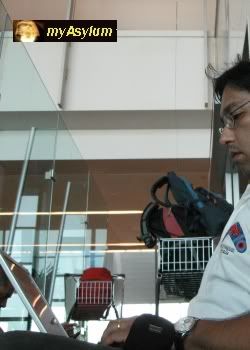 Walski started to write this as he sat on the floor at the Dubai International Airport departure area. Which actually looks more like a shopping mall, if one didn't know any better. The final destination still another 8 hours or so away.
Walski started to write this as he sat on the floor at the Dubai International Airport departure area. Which actually looks more like a shopping mall, if one didn't know any better. The final destination still another 8 hours or so away.
Yeah, the routing was a little fucked up, if you ask Walski. Why would anyone in their right mind want a travel routing that takes you from KLIA to Dubai (on Emirates), another transit in Doha (on Qatar Air) before taking another flight into Khartoum? The kind of travel agent that the company Walski works for, that's why. Just to save a few hundred ringgit.
In any case, there is a good reason why Emirates ranks as one of the world's best airlines, and if you were to ask Walski, probably a notch or three better than our own Malaysia Airlines. For one thing, their fleet is a lot more modern, with an average aircraft age of 5.4 years.
Dubai International Airport is something else. This is the first time Walski's actually been here, although he's heard about it from several people. If you passed out on the plane, were carried out, and woke up in the airport, you'd be forgiven if you thought you were in a shopping mall, and not an airport.
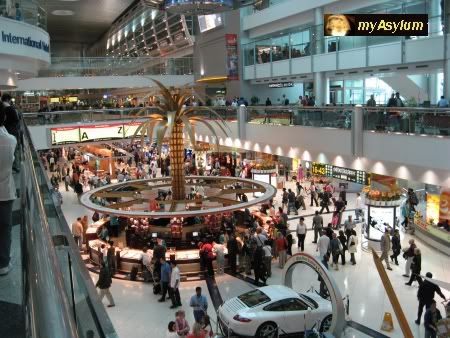 Perhaps the best duty free shopping on planet Earth...
Perhaps the best duty free shopping on planet Earth...
And it probably will get better in years to come. At the time Walski was there (two Sundays ago), the airport was going through some really massive expansion.
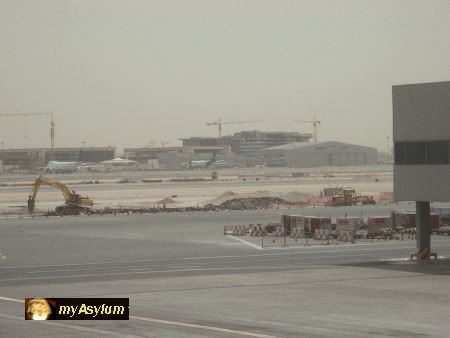 Cranes, planes and massive expansions underway at Dubai International
Cranes, planes and massive expansions underway at Dubai International
In fact, there is a lot of construction throughout the Gulf region, not just in Dubai. This part of the world is experiencing some of the biggest growth, and Dubai is perhaps the prime center for commerce, industry and IT. And it would probably surprise one to find out that the revenue the Dubai economy generates (US$ 46B in 2006, according to Wikipedia) is not contributed by Oil & Gas and Petrochemicals. In fact only 3% come from these two industry sectors. The main contributors to the economy are, in fact, the services, IT, finance and tourism industries.
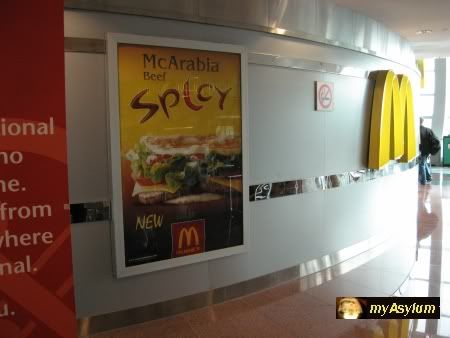 Last McChance for a Happy Meal (or the localized Spicy McArabia)
Last McChance for a Happy Meal (or the localized Spicy McArabia)
But enough about Dubai. Suffice it to say that Walski is truly impressed with the city, and will definitely put it on his must-visit places in the near future.
So, after the 7-hour layover, Walski continued his trip. To Doha, on Qatar Airways. Kinda silly to hop around like that. And yes, it is tiring. The final destination, Khartoum, still about 7 hours or so away.
(the trip continues, with lots more pix, in the full post)
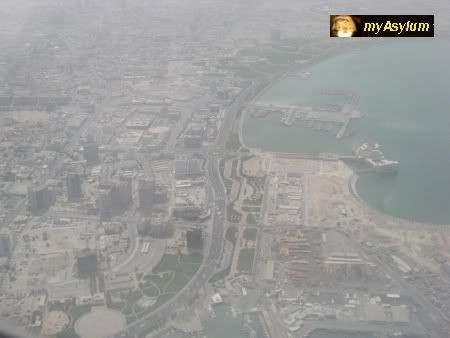 Aerial view of Doha city
Aerial view of Doha city
Doha, Qatar, too, is experiencing phenomenal growth. But unlike Dubai, Qatar's economy is fueled primarily by its Oil & Gas industry. Walski's been told that there is almost a developmental race between Doha and Dubai. And viewing both cities from the air, Walski believes this is probably true.
The layover at Doha International Airport was brief in comparison - only an hour-plus. Which is a good thing, too, because having come from the World's Best Duty Free, Walski now arrived at (probably) the world's smallest Duty Free - much smaller than KLIA's and definitely miniscule compared to Dubai's. And this is the new airport, which catered for the recent 15th Asian Games last December. Well, airport-wise, Doha's got a lot of catching up to do.
So, after spending the whole morning in the Gulf, Walski was finally on his flight headed for Khartoum, on Qatar Airways. Not a bad airline, but definitely not in the same league as Emirates. Flight time between Doha and Khartoum - 3 hours.
Part 2 - Sun, Sand and Sudan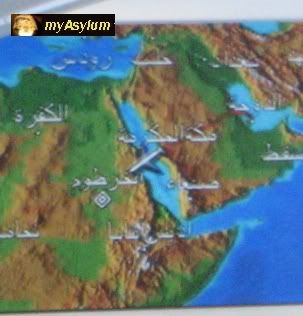 Finally, after crossing Saudi Arabia, and the Red Sea, Walski crosses over into Africa, somewhere around the region of Port Sudan.
Finally, after crossing Saudi Arabia, and the Red Sea, Walski crosses over into Africa, somewhere around the region of Port Sudan.
One of the things that hit Walski, coming from the lush terrain of South East Asia, is how much brown there is on the ground. Desert - as far as the eye can see. That's the brown parts you can see on the flight progress monitor on the right. Even the green parts are not really green - not like at home anyway. In any case, the color difference on the flight progress map indicates terrain and altitude, not vegetation.
It's interesting looking out the window while flying over the desert, particularly over Saudi Arabia, which is actually quite mountainous overall. The sight of terrain changes, with sand, instead of trees, is a very different sight altogether, and looks like one is flying over another planet, not Earth.
Sudan is the largest country in Africa, and latest estimates put the population at approximately 35 - 37 million (source: Wikipedia). Many people, upon hearing that Walski was Sudan-bound, were a little worried because of the continued problems in Darfur, which is a district in Western Sudan. Darfur is actually an area the size of Texas, and is over 1,000 miles away from Khartoum, the capital city, perhaps one of the safest cities Walski's ever been to (more about that later).
And in fact, the biggest problem currently plaguing Darfur is not so much the ongoing conflict (there are small skirmishes still, but very isolated), but the refugee problem resulting from the conflict between the Janjaweed (the allegedly government-backed forces) and the various tribal factions in the region.
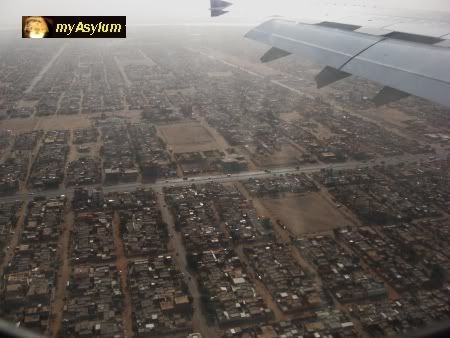 Approaching Khartoum - everything below looks brown!
Approaching Khartoum - everything below looks brown!
The UN, however, was recently allowed into Sudan, and while Walski was there, there were already a number of UN vehicles and officials that could be seen around Khartoum. There were at least 4 on Walski's flight. Allowing the UN in probably would alleviate some of the pressure of sanctions threatened by the world body. As it is, many EU-based companies had recently pulled out of Sudan, most notably Siemens, some months back.
Walski was told, by one of his customer contacts in Khartoum, that the main reason the US is interested in the Darfur area, and pressuring the Sudanese government via sanctions, is that Darfur has rich uranium deposits, among other things. This article from Global Research sort of corroborates that claim. In addition, the region is also said to have large hydrocarbon reserves, as well as copper.
Be that as it may, Sudan is definitely a country that is developing at a rapid rate. Although sanctioned by the U.S., and unofficially shunned by many EU-based conglomerates, other nations have stepped in to take advantage of the opportunities here, particularly in the Oil & Gas, Power and infrastructure development sectors. Among these countries (that Walski saw first-hand), Libya, China and Malaysia. Through Petronas, Malaysia has reportedly invested some US$ 6B, primarily in the Oil & Gas sector in the last decade. These investments have apparently already been recouped in full (as related to Walski by the same customer contact). Petronas is quite active in Sudan, involved with several joint-venture companies, primarily the White Nile Petroleum Operating Company (WNPOC), in which the Malaysian corporation has majority equity share, and is whom Walski came to meet.
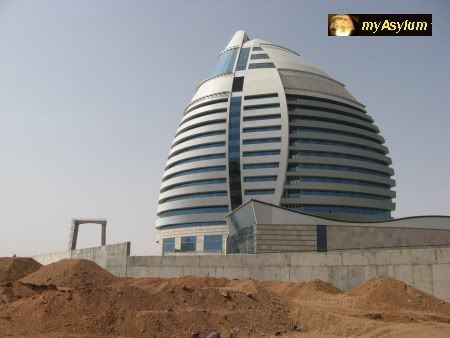 The Great Al-Fateh Tower project - being built by the Libyan Foreign Investment Co.
The Great Al-Fateh Tower project - being built by the Libyan Foreign Investment Co.
But enough of the socio-politics and economics for now.
40+ degree Celcius weather with 1% humidity really hits you full-frontal and hard, if you've never experienced it before. And this was Walski's first time being in such an arid environment. It was only on the way to the hotel from the airport that Walski realized he'd forgotten one tiny but very important piece of toiletery - lip balm! But too late... and because of that Walski had to endure chapped lips the entire duration of the visit.
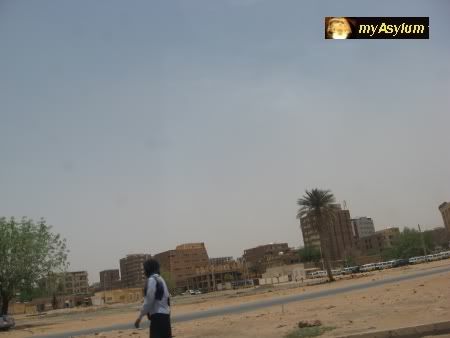 Where there are no buildings, Khartoum's got sand
Where there are no buildings, Khartoum's got sand
If you're thinking of making a trip to Sudan, there are a few things you'll need to know. Malaysians can enter Sudan via Visa On Entry. However, if your stay is 3 days or longer, your passport will need to be registered. The hotel usually takes care of this, for a fee of USD 50 - 60 (maybe more, depending on the hotel) - and the hotel keeps your passport until you check out. Also, due to the US sanctions, credit cards and travellers checks are not useable in Sudan. Bring cash - preferably US Dollars (yes, Walski knows the irony of this). But only change to the local currency when you absolutely need to (he'll tell you why later).
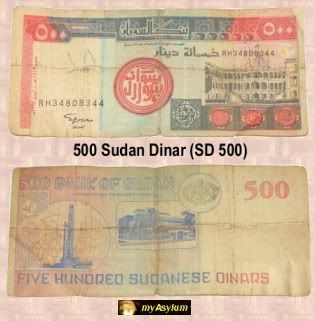 Which brings us to currency. There are two concurrently used currencies in Sudan: the Sudan Dinar (SD) and the Sudan Pound (SDP). There also used to be the Old Sudanese Pound, but it's no longer in use, so Walski won't bother talking about it.
Which brings us to currency. There are two concurrently used currencies in Sudan: the Sudan Dinar (SD) and the Sudan Pound (SDP). There also used to be the Old Sudanese Pound, but it's no longer in use, so Walski won't bother talking about it.
Conversion between the Dinar and the Pound: 100 Dinar equals 1 Pound. The prevailing rate of exchange from the US Dollar, during Walski's visit, was 200 Dinar (or 2 Pounds) for 1 US Dollar. There are money changers all over Khartoum, and most hotels provide this service as well. Just make sure that the rate is around US$1 = SD 200 = SDP 2.
Price tags for goods can be confusing as they could be in SD or SDP, without warning, and usually without the currency prefix (except in large shops). Rule of thumb: if the price is in the hundreds or thousands, it's most likely in SD. When in doubt, though, ask. Which can be a challenge, unless you can speak Arabic.
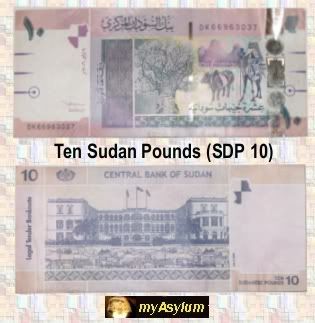 The cost of living can be quite high in Khartoum. A 1.5L of mineral water costs about SD 300 (about US$ 1.50). And if that sounds expensive, it is. The cost of living in Sudan is actually equivalent to that of Hong Kong. Think of it as Hong Kong, minus the entertainment, fun and good public transportation. A small 3-bedroom apartment will set you back about US$ 1,000 - 1,500 per month, particularly in the more expat-popular neighborhoods. A taxi ride will be anywhere from SDP 10 (for a 5km trip) to 20 (for a 15km trip).
The cost of living can be quite high in Khartoum. A 1.5L of mineral water costs about SD 300 (about US$ 1.50). And if that sounds expensive, it is. The cost of living in Sudan is actually equivalent to that of Hong Kong. Think of it as Hong Kong, minus the entertainment, fun and good public transportation. A small 3-bedroom apartment will set you back about US$ 1,000 - 1,500 per month, particularly in the more expat-popular neighborhoods. A taxi ride will be anywhere from SDP 10 (for a 5km trip) to 20 (for a 15km trip).
Imagine KL prices, then multiply them by 3. Having said that, Walski's not sure if the locals would pay as much or not. And it's not difficult for the locals to tell that Walski is not Sudanese.
Incidentally, there are 2 reason why you should only change money when necessary. First, the US Dollar is generally accepted by most shops and taxi drivers (bring small notes). Secondly, neither the Dinar or the Pound are convertible outside of Sudan (as far as Walski knows). What extra left over from your trip is probably only useful for showing folks that you were actually in Sudan. Walski left with about US$ 32 worth - which is okay, 'cause he's going back in a few month's time. Plus, his engineers will be travelling to Sudan quite regularly, so Walski could dump it off them if he's desperate.
Khartoum sits at the confluence of the Blue and White Nile rivers, and is actually two cities - Khartoum North and Omdurman - linked by a series of bridges. Walski didn't get a chance to do a lot of sightseeing during this trip (he was travelling with his boss, and 3 days of meetings doesn't make sightseeing easy). The older (and maybe more interesting) part of Khartoum, Walski's told, is Omdurman, across the river from where the customer vists were made.
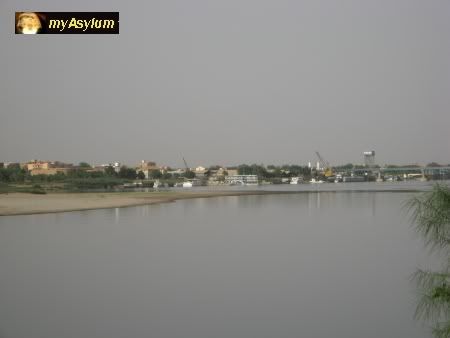 The Blue Nile, parts of Omdurman, and the blue bridge (one of a few) that connects the two parts of Khartoum
The Blue Nile, parts of Omdurman, and the blue bridge (one of a few) that connects the two parts of Khartoum
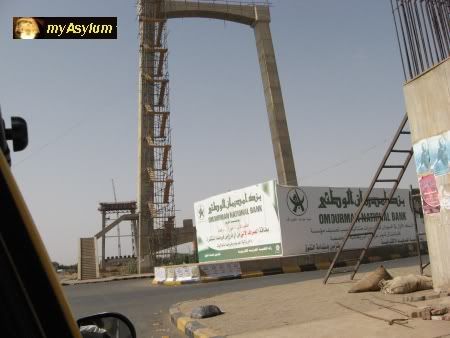 New Blue Nile bridge, next to the Al-Fateh Tower, said to be funded by the China government
New Blue Nile bridge, next to the Al-Fateh Tower, said to be funded by the China government
How would Walski describe Khartoum - or at least the parts he saw? In a nutshell, it's a city in dire need of infrastructure, and greenery. Compared to places like Dubai or Doha, empty spaces in Khartoum are usually left sandy - it's original desert look. It takes a lot of resources to maintain nice turf, and resources are something that Sudan has to prioritize very carefully because of the sanctions, and its cummulative effects.
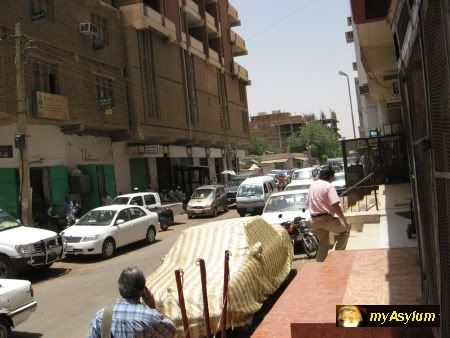 Khartoum's central business district - run down, messy and not quite what a CBD usually looks like
Khartoum's central business district - run down, messy and not quite what a CBD usually looks like
One interesting thing Walski found out is that all the privately built buildings one sees in Sudan are fully paid for in cash. Because of the US sanctions, in part, you don't get the usual credit facilities you'd typically find elsewhere. This means that buildings are constructed as much as possible until the money runs out, at which point the construction gets put on hold indefinitely, until there's more money. Because of this, partially built structures are a common sight in Khartoum. The same goes with infrastructural construction.
But quite honestly, for all its shortcomings, Khartoum has to be one of the safest places Walski's visited, hands down.
Unlike many parts of Africa, where petty thievery is notorious (Nairobi, capital of Kenya, is supposedly known to some locals as Nairobbery because petty theft is so rampant), Khartoum, and presumably the rest of Sudan, is pretty much petty-crime free. At least the kind of crime that tourists would generally be worried about - snatch thieves, pickpockets, etc.
Which is not to say that one should flaunt their SDP's all over the place - that just attracts trouble anywhere in the world. In other words, just practice good tourist common sense, and you'll be okay.
One reason Walski gathers why Khartoum is petty-crime free is because there are police officers (of various varieties and uniforms) all over the place. During his visit, Walski could see at least 4 - 5 different types of uniforms being worn. Some may have been the military, and not police per se. That, and the people in general are quite honest, plus there isn't the hardcore starvation-type of poverty one may have expected..
Oh, about the police in Sudan - if you need to take pictures and there's police personnel in your viewfinder, ask their permission first. Sudanese love to have their picture taken, but the police can be a little sensitive about it - Walski's heard stories of his customer's colleagues having to spend the night in jail because of this. So, just be courteous and ask first. It's safer that way - unless your itinerary must include a night in a Sudanese prison cell.
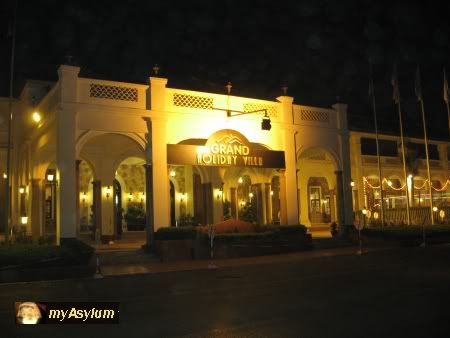 Yes, it is a Malaysian hotel, in case you were wondering
Yes, it is a Malaysian hotel, in case you were wondering
Since Walski had to travel efficiently between his hotel and customer's office, the choice of transportation was limited to taxis, or maybe the minivans (called "abjad"). Another popular type of conveyance is the scooter taxi (don't remember what the local name is). But these generally only operate in the outskirts of Khartoum, and do not go into the city center.
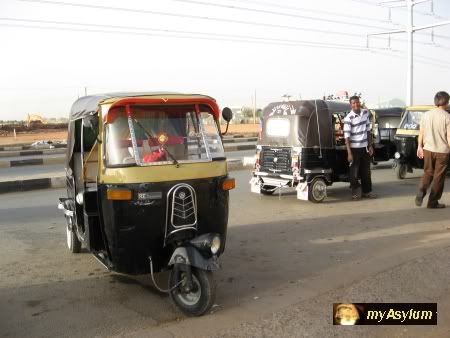 Didn't try this public conveyence - the suburbian scootertaxi
Didn't try this public conveyence - the suburbian scootertaxi
If you don't speak Arabic, it would be a good idea to keep your hotel name card handy, as otherwise it would be next to impossible to get a taxi from one place to another. If travelling by taxi from the hotel, ask the staff to help tell the taxi driver where you're headed.
Speaking of taxis, Khartoum (and probably Sudan) has probably the most delapidated taxis, with an average age of 30+ years. And without air-conditioning. In the hot weather that Walski experienced, rolling the window down gives you a great blast of hot desert air in your face. With a fair amount of fine dust thrown in for good measure. Walski already mentioned how much they cost, but if you really need to get somewhere fast, taxis are probably the transportation of choice. And no, they don't use meters.
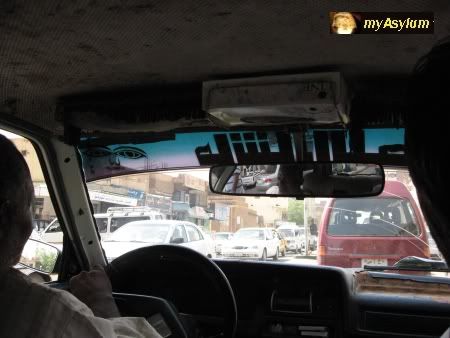 All the taxis in Khartoum are just about as cruddy looking
All the taxis in Khartoum are just about as cruddy looking
Driving in Khartoum, in a nutshell, is an adventure in itself. The drivers here make driving in Kuala Lumpur seem like a cake-walk. Similar to Saigon, vehicles move much more slowly, but in a totally haphazard way. Yes, there are lanes, but they don't mean squat. They have even less meaning compared to KL. It is that bad. Which means that you would occassionally have vehicles coming at you from the opposite direction, on your lane. Be that as it may, everyone on the road seemed to know what to do, and there seems to be some unpublished law in action. Plus, Walski didn't see a single accident while he was there.
The one thing that Khartoum does not have much of is recreation facilities. In the entire city of 6 million, there is but one shopping mall. The Afra Mall is located just beside the Khartoum International Airport, which is in the southern part of the city. The mall is about half the size of Bangsar Shopping Center, with two floors.
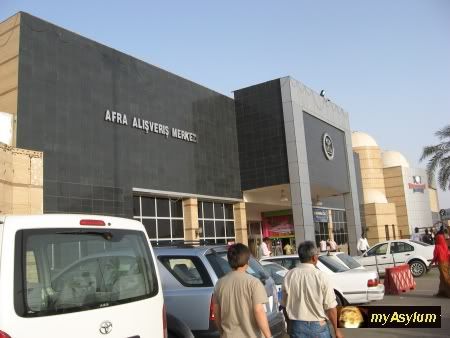 Afra Mall not far from Khartoum International Airport
Afra Mall not far from Khartoum International Airport
The mall has the basic stuff - a very large supermarket, electronics stores, clothing outlets, a cafe (Gloria Jean's no less), a bowling alley (in severe need of maintenance), but, as an added bonus of uniqueness, no air conditioning whatsoever. Although designed with a/c vents, the compressors are probably busted, without any means of being repaired. Either that or they are to be added in the future (according to Walski's customer, he's never seen the airconditioning turned on, ever).
And this is another side-effect of the US sanctions - the inability to maintain existing facilities. It is a serious problem facing not just Afra Mall, but industry here as well, as Walski found out first-hand from his customer WNPOC, who have quite a fair bit of US-made major equipment. like gas compressors, motors, etc.
In addition, there are currently no cinemas in Khartoum. However, there are a number of up-market (for local standards) cafes and restaurants, which are fast becoming popular even among the more affluent locals. And most offer free Wi-Fi.
Although Sudan is an Islamic country, and has imposed Syariah laws, Walski didn't see the kind of segregation one would imagine - like those imposed in Kelantan - where there are separate lines for men and women, and other strict separation of the sexes. Women are not forced to cover up, like in Saudi Arabia. The traditional African female garb, which does provide loose head cover (similar to how the saree is worn by Indian Muslims), is what the women here wear, especially outdoors. This traditional dress does provide a practical use for keeping out the dust. However, once indoors, the women do allow the head cover to slip.
The whole 3 days or so that Walski was here, he only saw the niqab (the Saudi full-cover, except for the eyes, female dress) once. The only sign of segregation of sexes that Walski saw, was when it comes to the use of swimming facilities.
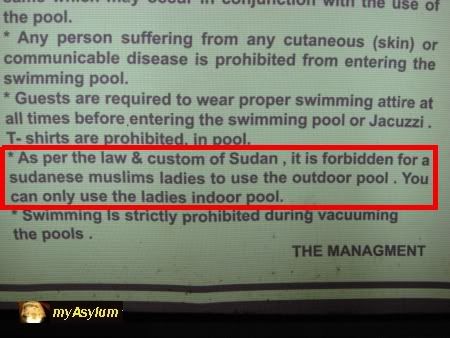 The only sign of sex segregation (pool-side notice at the hotel Walski stayed at)
The only sign of sex segregation (pool-side notice at the hotel Walski stayed at)
As far as Walski knows, there isn't a separate Morality Police (like in Saudi Arabia) that lurks the city to ensure that people are compliant to morality laws. Also, Walski saw a few churches around Khartoum, indicating that religious tolerance is something practised here as well.
So what are the booming industries in Sudan? Oil & Gas would probably be one of the major revenue earners. As it is, WNPOC is one of the two very active hydrocarbon production companies in Sudan, other than the Greater Nile Petroleum Operating Company (GNPOC). Petronas has shares in both companies, although it has controlling interests in WNPOC, and only about 30% in GNPOC. In addition to Malaysia, China has perhaps the largest stake in the Oil & Gas business, owning about 40% stake in GNPOC.
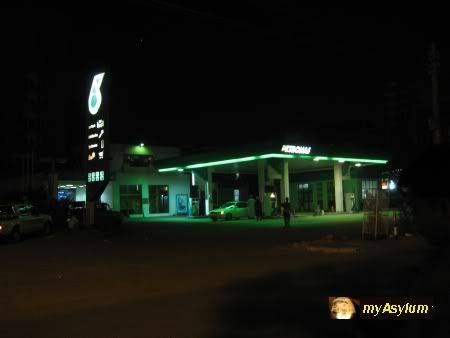 A familiar sight to Malaysians - Petronas is pretty big in Sudan
A familiar sight to Malaysians - Petronas is pretty big in Sudan
Traditionally, agriculture has been the main industry in the country, and Sudan has quite a large producer of cotton and cane sugar. An estimated 80% of the workforce is still involved in agriculture (source: Wikipedia). Oil, however has become the largest export of late, and has been the bigger source of revenue in recent years.
Most of Sudan's known oil reserves lie in the southern region of the country, which until a few years ago was also an area of conflict, until a peace agreement was signed between the Sudan government and the Sudan People's Liberation Army (SPLA). Since then, the southern region has been under autonomous rule and there is talk that the southern region of Sudan may seek independence, as stipulated by the Nairobi Peace Agreement, signed in 2005. It is rumored that because of this possible secession of the south, oil is being pumped out as fast as possible. At least, that's what Walski was told. (Wikipedia has an extensive write-up of the North-South conflict, if you're interested in reading about this further)
So, after three and a half days of intense desert heat, dryness and dust, Walski bade farewell to Khartoum. But he'll be back, for sure, as there is much work left to be done. Perhaps during the next visit, Walski gets to venture into Omdurman, and look at the other side of Khartoum, which he didn't get a chance to see.
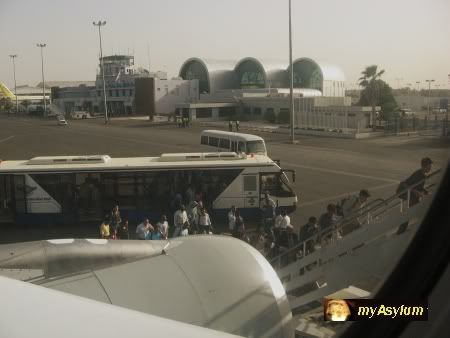 Glad to leave for home, but more than glad for the Sudan experience
Glad to leave for home, but more than glad for the Sudan experience
Another thing that Walski didn't get to experience on this trip, fortunately, was sandstorms. He was told that these usually occur around July - September when its the rainy season. When these sandstorms hit, flights are delayed (sometimes cancelled), and life becomes just a little more unbearable.
In any case, this visit was an eye-opener for Walski. Sudan, at least Khartoum, turned out to not be as bad as he thought it might be. Khartoum is a city that's trying its best to grow and flourish, despite having many limitations set upon it, due to the sanctions that Sudan currently faces. Who knows - the next visit here, Walski may have more things to report, and may have the opportunity to visit other parts of the city.
And next visit, Walski will definitely remember the lip balm...
Appendix - Personal thoughts on Darfur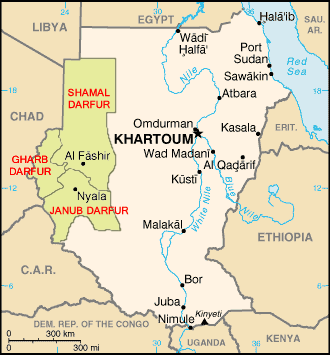 No post on Sudan would be complete about stating something pertaining to Darfur. Khartoum is very well insulated from the problems plaguing the western part of this large nation, and Darfur is not something many people talk about (and if they did, it was in Arabic, which Walski doesn't have a good command of).
No post on Sudan would be complete about stating something pertaining to Darfur. Khartoum is very well insulated from the problems plaguing the western part of this large nation, and Darfur is not something many people talk about (and if they did, it was in Arabic, which Walski doesn't have a good command of).
Like a lot of problems plaguing the African continent, the root of the Darfur conflict is, in part, tribal in nature. Tribalism is still a very strong force in the continent, and is apparent in many areas of life in Africa. Tribal rivalry transcends race and religion, in fact. Darfur is not about an inter-religious struggle. All the fighting factions, in this case, are Muslim, unlike the North-South civil war.
Yes, there has been terrible conflict in this western region of Sudan, and there have been mass murders and mass rapes committed. But to call it a genocide would probably be misleading. The UN Commission of Inquiry on Darfur Report, released in 2005 could not find any "genocidal intent". There still are skirmishes in Darfur, even as recently as mid-April this year.
Despite claims by many, what's happening in Darfur is definitely not another Rwanda. It is not a systematic elimination of the "other" like in the Rwandan case. The only similarity is that the roots (partly) are tribal in nature.
The biggest problem right now, however, is the refugee problem. And the fact that the refugee camps themselves are not safe haven from the various tribal factions that are still fighting. There have been reports that some refugees are on the run for a second time, after having moved back to the villages. In this, the world has failed Darfur. The UN, while trying to help, is itself helpless without any real financial and military support from the wealthier nations of the world. There is way too much talk (i.e. politics), and way too little support and real action from member states.
And what about the OIC? More talk than action so far. Malaysian Prime Minister, Abdullah Ahmad Badawi (who also is Chairman of the OIC) made a visit to Sudan recently, and included in the itinerary was Darfur. He indicated that the OIC would accept any proposal that would be beneficial to solving the Darfur problem. Almost at the same time, President Omar Al-Bashir made a u-turn and allowed the entry of the UN.
The ongoing pressure being exerted by the United States has possibly two motives, in Walski's view. The first is to divert the attention of the world from it's blunderous Iraq campaign. Second possibility would be that the Darfur region is rich in mineral resources, primarily oil, pure uranium and copper.
That said, Walski's not saying that the Sudan government has not had a hand in the conflict in the past.
But sanctioning Sudan is not a way to solving the region's problems, which are in part economic, and in part tribal. The roots of the Darfur conflict can be traced to the drought-induced famine of 1983 - 84. In fact, sanctions only make efforts to better the economic conditions of the country more difficult. Sanctions do more harm than good, and Walski saw some of its delibitating effects in Khartoum. (Granted, while not being able to use credit cards or travellers checks, and shopping in an un-airconditioned mall, are admittedly miniscule problems compared to the bigger picture, it's still a right pain in the ass).
One thing is certain, however. There has been a lot of talk and not enough action from the international community, particularly on the part of the OIC member countries thus far, in helping solve the problems in Darfur. Allowing UN peacekeepers into Darfur would probably help, in providing a more neutral police presence, but the OIC must also do its part to fund peacekeeping and humanitarian efforts. Up till now, it has been up to the African Union (AU) peacekeeping forces, and the token AU forces are simply too few, and ill-prepared to take on such a monumentous task. Don't forget - Darfur is HUGE.
So, is there a real and viable solution to the problems facing Darfur? Perhaps. But it will take the monumental task of getting the world's wealthiest nations to put aside their own personal interests in Darfur, and to sincerely work together, via the UN, to put together a solid plan covering both economic and political aspects of the conflict and resulting refugee problem, and implementing the plan. What's needed is sincere commitment, and funding, from all nations. Darfur also needs expertise, from all nations, to ensure that once peace has been established, the region can sustain itself, from an economic viewpoint.
And getting nations to work together towards a common, no-strings attached goal, by any measure, is no easy task.
Walski's important post-disclaimer: The opinions and obersvations made in this post are entirely from Walski's perspective, based on his brief visit and based on what he already knows about the situation in Sudan. Walski has made every effort to be objective and non-partisan, particularly on the topic of Darfur.
















